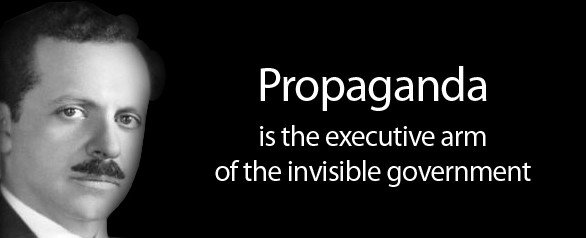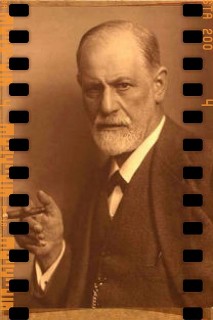
Transforming Citizens Into Consumers
… by Dr. Stuart Jeanne Bramhall
The Century of the Self is a four part BBC documentary that delves deeply into the life and work of Sigmund Freud’s nephew Edward Bernays. Bernays was the first to perfect the science of thought control. In the political sphere, he referred to mass psychological manipulation as “engineering consent.” When he used propaganda and psychological manipulation to condition consumers to purchase products, he called it “public relations.”
________________________________
The Century of the Self
Film Review
 Part 1 (Happiness Machines) and Part 2 (Engineering of Consent)
Part 1 (Happiness Machines) and Part 2 (Engineering of Consent)
The twentieth century is frequently referred to as the selfish century. This documentary lays the blame for this at the feet of Sigmund Freud and his nephew Edward Bernays.
Prior to World War I politicians and businesses used facts and information to win votes or to persuade people to buy their products.
When Woodrow Wilson hired him to run his Committee for Public Information to produce pro-World War I propaganda, Bernays incorporated Sigmund Freud’s theory that human behavior was based on unconscious instinctual drives.
By appealing to these unconscious and irrational feelings, he succeeded in selling World War I to a profoundly isolationist American public.
As well as his pivotal role in engineering corporate and government propaganda, Bernays was also responsible for popularizing Sigmund Freud’s work by emphasizing its sexual content.
The Shift from a Needs to a Desire Based Culture
Curious whether similar techniques would also work in peace time, Bernays hired himself out to corporations to help them improve their sale of consumer products. His goal was to shift US society from a needs culture, where people only bought what they needed, to a desire culture, where they purchased products to make them feel better. Aware that the word propaganda had an extremely negative connotation, Bernays coined the term “public relations.”
Bernay’s stunning success gave birth to 1920s “consumptionism” and was largely responsible for the economic bubble that resulted in the 1929 crash. Already by 1927, social critics were concerned that Americans were no longer citizens but consumers.
Confident of their ability to engineer consumer demand, banks funded national expansion of department store chains and hired Bernays to persuade ordinary people to borrow money to buy shares in the stock market. Driven to record levels by borrowed money, the stock market collapsed.
During the Great Depression, Bernays shifted gears to focus more on influencing public political views. Neither Freud nor Bernays believed in the equality of man. Frightened by the rise of fascism in Europe, both believed that democracy was a fundamentally unsafe form of government (due to human beings’ dangerous unconscious drives).
Both believed that people must be controlled – that mass democracy could only work if popular consent was engineered. Bernays was also convinced that the best way to control people in a mass democracy was to render them passive consumers – by triggering a continuous irrational desire to consume and satisfying it with consumer goods.
_________________________________
Roosevelt Tries to Rein in Business
Unlike Freud and Bernays, Franklin Roosevelt believed that people were capable of knowing what they wanted and relied on the new science of public opinion polling (pioneered by George Gallup) to ascertain what people were thinking. His response to the Great Depression was to grant himself extensive executive power and subject business to central economic planning, which they hated.
In 1936, the National Association of Manufacturers hired Bernays to initiate an ideological campaign against the New Deal (and the rise of unionism as Alex Carey mentions in Taking the Risk Out of Democracy).
When World War II ended, the CIA hired Bernays to advise them on how to control the “irrational aggression” of the masses. In his CIA role, Bernays devised a campaign for the Eisenhower administration to convince the American public they were under imminent threat from Soviet Communism.
As part of this campaign, Bernays mobilized public and congressional support for the 1954 coup against Guatemala’s democratically elected president Jacobo Arbenz. Bernays also worked for the United Fruit Company, which was concerned about Arbenz’s plans for land reform, i.e. breaking up their extensive Guatemalan banana plantations.
The Birth of the Focus Group
Meanwhile the public relations industry hired psychoanalysts to set up focus groups to use advertising more effectively to improve consumer demand for corporate products. These early focus groups employed psychoanalytic techniques to help advertisers improve sales by secretly appealing to unconscious needs and insecurities.
[vimeo 85948693]
[vimeo 48842898]
photo credit: Carla216 via photopin cc
__________________________________
Dr. Bramhall is a retired American child and adolescent psychiatrist, activist and political refugee in New Zealand.
Her first book The Most Revolutionary Act: Memoir of an American Refugee describes the circumstances that led her to leave the US in 2002. She has also published two young adult novels about political activism: The Battle for Tomorrow: A Fable
View All Books by Dr. Bramhall >>>
She is involved in the national leadership of the New Zealand Green Party and has a political blog at StuartJeanneBramhall.com
ATTENTION READERS
We See The World From All Sides and Want YOU To Be Fully InformedIn fact, intentional disinformation is a disgraceful scourge in media today. So to assuage any possible errant incorrect information posted herein, we strongly encourage you to seek corroboration from other non-VT sources before forming an educated opinion.
About VT - Policies & Disclosures - Comment Policy



